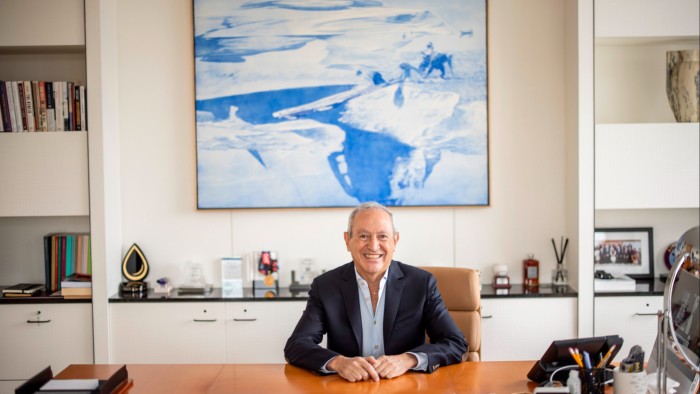Stay informed with free updates
Simply sign up to the Private equity myFT Digest — delivered directly to your inbox.
The private equity industry is past its peak and faces a massive challenge in selling off trillions of dollars in assets, according to Egyptian industrialist and billionaire investor Nassef Sawiris.
Sawiris, who has invested parts of his fortune in funds at multiple buyout firms, said he and others who back private equity funds were frustrated with the lack of distributions in recent years. Firms have struggled to exit investments amid a post-pandemic slowdown in dealmaking and initial public offerings.
“Private equity has seen its best days . . . They can’t exit. Exits are so tough,” Sawiris told the Financial Times.
“[Investors] are so frustrated. They are telling them [buyout firms]: ‘I haven’t seen any returns, you haven’t returned any cash to me in the last five, six years’.”
Sawiris took particular aim at the use of “continuation funds” to recycle capital — a tactic whereby private equity groups, instead of selling an asset to another owner or publicly listing it, move the asset into a new fund where they still maintain control.
“Continuation funds is the biggest scam ever because you say ‘I cannot sell the business, I’m going to lever it again’,” Sawiris said.
Continuation vehicles have grown increasingly popular in recent years, surging about 50 per cent to hit a record $76bn last year, according to a report from investment bank Houlihan Lokey.
The comments come as Sawiris has been overseeing the break-up of his Dutch-listed chemicals and fertiliser empire OCI.
The group in September agreed its fourth major disposal, bringing gross proceeds from its asset sales to $11.6bn from deals that were all struck with trade buyers rather than buyout shops. It has now sold off most of its assets, including its global methanol business, fertiliser holdings and a low-carbon ammonia project in Texas.
OCI has used these sales to return cash to shareholders. Including a payment to be made later this week, it has distributed $6.4bn in the past four years, with a further payout of up to $1bn expected after it closes the sale of its methanol business.
Sawiris said the company was “very lucky with the timing” of the disposals given the market turmoil that has disrupted dealmaking, the turn against investing in more sustainable assets, and a decline in gas prices.
Sawiris told the FT in an interview last year that OCI could be turned into a cash-shell company that pursues acquisitions in different industries.
He said he was approached about buying dozens of companies with the proceeds from his asset sales.
Many of them were owned by private equity groups hoping for an exit, Sawiris said, adding that he did not find a single one of them to be an attractive target for a deal.
“A year ago we looked at 70 different companies that would have wanted to be merged with OCI because they were levered, and get a listing and all that . . . all private equity that can’t get an exit,” he said. “We said ‘like, why are we are there to solve somebody else’s problem’?”
He also criticised private equity managers’ priorities, saying they were far more focused on raising capital for their investment vehicles than their portfolio companies’ operational performance.
“They’re spending 90 per cent of their time fundraising and 10 per cent managing the businesses,” he said. “They attend board meetings, have a board dinner and there’s a reason why they didn’t execute the plan.”
After decades of expansion, the private equity industry’s assets under management shrank last year for the first time since the consultancy Bain & Co began tracking industry assets in 2005.
The industry’s assets in June 2024 were down just 2 per cent on a year earlier to $4.7tn, buyout groups have faced further challenges as the market volatility unleashed by US tariffs slowed dealmaking.
Investment groups have faced trouble selling assets after buying them at high valuations in recent years, complicating their fundraising efforts.
Amid the broader challenges facing the private equity industry, Sawiris said the groups best positioned to succeed were those that had grown big enough as financial institutions such as Blackstone to challenge the major lending banks.
“The only guys that have a future are the guys that found a niche to be a competitor to JPMorgan and Bank of America.”
Read the full article here




